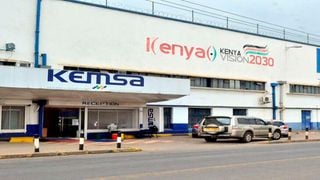
Kemsa offices in Nairobi's Industrial Area.
| File | Nation Media GroupNews
Premium
Kemsa made ‘wilful’ errors to siphon Sh7.8bn from taxpayers
The Sh7.8 billion Kenya Medical Supplies Authority (Kemsa) scandal was carefully planned through several mistakes that managers knowingly made in a bid to siphon taxpayers’ money.
A report by the Public Investments Committee tabled in Parliament details acts of omission that aided the theft.
The issuing of procurement letters to more than 102 companies that supplied Covid-19 materials was skewed, with some getting preferential treatment.
The committee said Kemsa used commitment letters to award multimillion-shilling tenders but that is not provided for in procurement law, and all suppliers who appeared before the panel admitted as much.
MPs noted that a valid contract can only exist after the requirements of section 135 of the Public Procurement and Disposal Act 2015 have been met and the documents signed by the supplier and the accounting officer.
Marred by irregularities
The issuing of commitment letters was marred by irregularities, the report says, with suspended CEO Jonah Manjari alleged to have instructed the backdating of some commitment letters for Shop N Buy from May 5 to April 30, 2020
“The CEO acted in contravention of the Public Officers Ethics Act, 2012 which provides that a public officer shall carry out his duties in a way that maintains public confidence in the integrity of his office,” the report says.
To demonstrate lack of consistency in the procurement process, the report says some entities went through bidding processes and filled out tender documents before supplying while others supplied based on their commitment letters and then filled out tender documents later.
Skewed pattern
Payments to suppliers also reflected a skewed pattern. Companies that insisted on following procurement laws had their payments delayed though they were some of the earliest suppliers.
Companies like Harleys Ltd and Nairobi Enterprises Ltd correctly refused a commitment letter and insisted on using processes as outlined in the Procurement Act, 2015
“The fact that Kemsa followed due process of procurement law in dealing with some companies indicates that they knew what the law demanded of them but deliberately disregarded it when dealing with some entities,” the report says.
When MPs investigated the matter, suppliers such as Shop N Buy confirmed that they received their commitment letters at the office of Mr Manjari.
“All these violations of the law were brazenly committed by Kemsa management despite clear guidelines issued by the Solicitor General and the Public Procurement Regulatory Authority with regards to emergency procurement of Covid-19 equipment,” the report says.
No receipt vouchers
MPs found that most companies were not given receipt vouchers to show that they had submitted samples. Only Harley, Omaera Pharmaceuticals and Nairobi Enterprises were able to show such vouchers, an action the committee says was deliberate in order to accept substandard products.
The lawmakers also questioned why Kemsa insisted on paying Sh4,500 per box of 50 3-ply masks when other firms, such as Gladlab Ltd were willing to supply them for Sh3,000. Kemsa also fixed Sh9,000 as payment for PPEs per kit and KN95.
“The capping confirms that the prices were not negotiated but rather predetermined,” the report says.
There was no evidence, MPs said, that Kemsa contacted and exhausted existing prequalified suppliers of Covid-19 items.
Background checks
They faulted Kemsa for failing to conduct any financial or technical evaluation or background checks of the suppliers, including verifying their tax compliance, and hence ended up giving multi-million tenders to companies that had no capacity to supply products.
“All suppliers including those who had not been prequalified were only required to submit letters of intent indicating item description, quantities, estimated delivery date and were given commitment letters to supply Covid-19 Health Products and Technologies (HPTs)
The lawmakers also faulted Kemsa for procuring more Covid-19 equipment though they knew the stock in stores was not moving due to lack of demand, saying this amounted to wilful commission of a culpable offence.
“The committee established that the Head of Legal Services witnessed and executed all the impugned contracts without duly considering the validity of the same. The omission amounts to professional negligence and abuse of his office,” the report says.
The National Assembly will consider the report next week.





